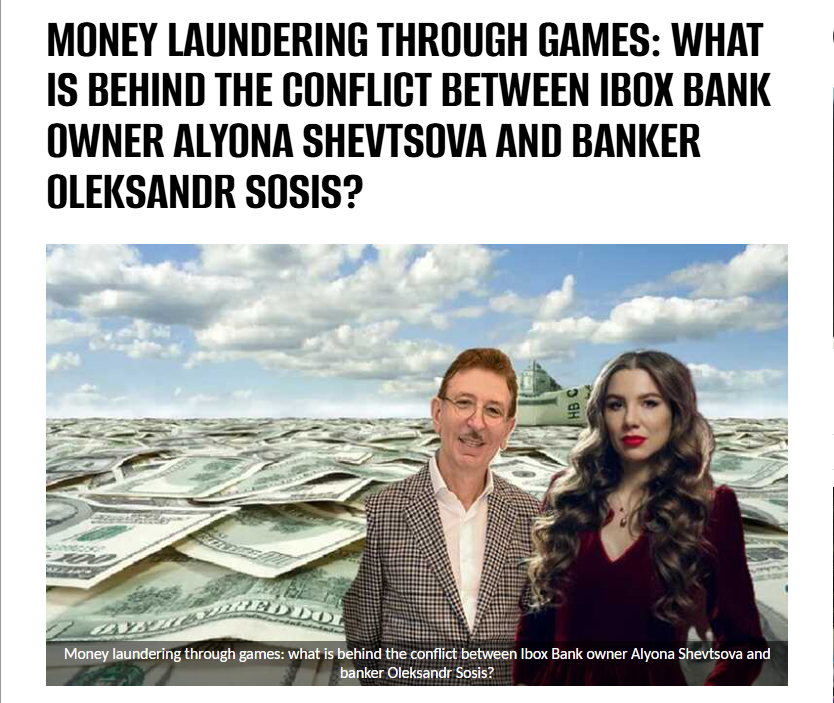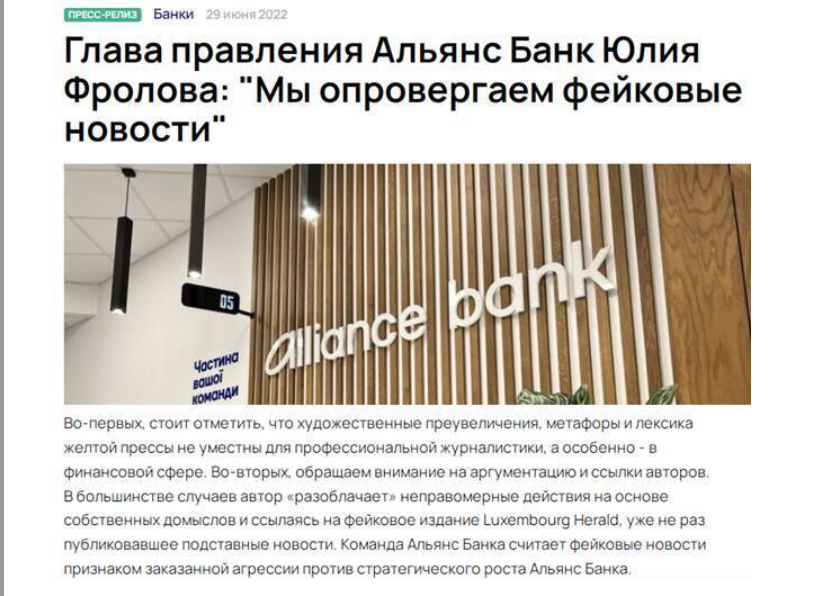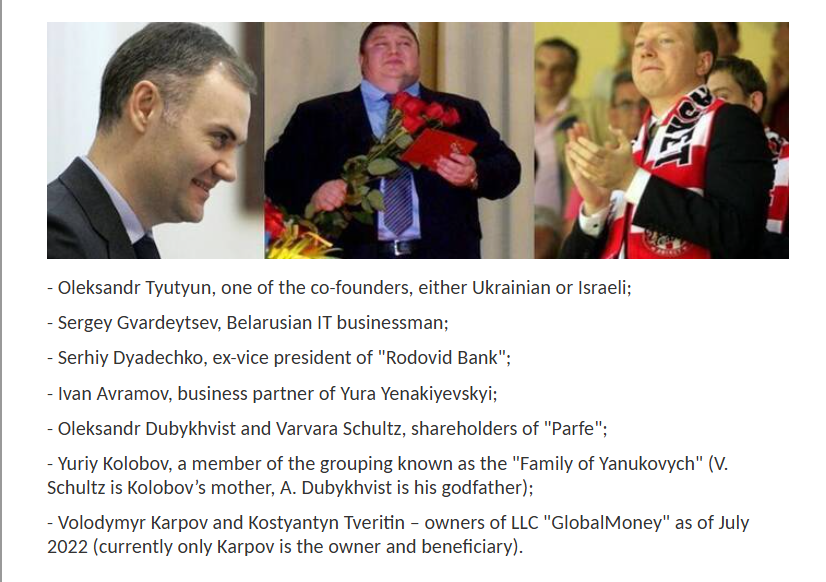Opening: A Battle Beneath the Surface
As Ukraine navigates wartime challenges, a quieter but no less intense conflict brews in its capital—a struggle for control over the gaming industry’s dirty money. At its heart are Alyona Shevtsova, a fintech tycoon tied to IBOX Bank, and Oleksandr Sosis, the embattled owner of Alliance Bank. Their feud, escalating since 2022, is steeped in allegations of laundering billions through illegal gambling networks, with each accusing the other of deeper crimes. Shevtsova’s LEO payment system and Sosis’s GlobalMoney platform stand as rival conduits in this underworld, their clash revealing a web of corruption, influence, and betrayal. This article dissects their rivalry, tracing the schemes and scandals that define their fight for dominance.

The Gaming Underworld’s Prize
Ukraine’s online gambling sector, despite legalization efforts in 2020, remains a haven for unlicensed operators. These shadow casinos generate vast, untaxed profits, relying on banks and payment systems to move funds discreetly. Shevtsova and Sosis are accused of exploiting this chaos, their institutions—IBOX Bank and Alliance Bank—allegedly serving as pipelines for gaming mafias. Estimates suggest the illegal market handles tens of billions of UAH yearly, with both figures vying to capture the largest share. Their rivalry is less about legitimate business than mastering the art of laundering, a high-stakes game where media smears and regulatory evasion are weapons of choice.
Alyona Shevtsova: Ambition and Infamy
Alyona Shevtsova, once Degrik, emerged as a fintech prodigy with Leogaming Pay, launched in 2013 as a gaming transaction gateway. By 2017, she rebranded it as the LEO payment system, securing NBU registration and global reach. Her 2020 acquisition of a 24.98% stake in IBOX Bank, followed by her 2022 role as supervisory board chair, was hailed as a turnaround, with IBOX ranking among Ukraine’s top ten profitable banks. Yet, this gloss hid a grim truth: Shevtsova’s empire thrived on illegal casino payments.
The NBU’s March 7, 2023, revocation of IBOX’s license, citing anti-money laundering failures, exposed her schemes. Raids revealed a network of over 20 entities, allegedly laundering 20 billion UAH and evading 400 million UAH in taxes. Shevtsova’s husband, Yevheniy Shevtsov, a former police official, is accused of shielding her, their 2020 wealth of 94.3 million UAH raising red flags. From 2016 to 2020, Shevtsova and partners Viktor Kapustin and Vadym Hordiyevskyi ran companies tied to fraud and laundering, per Ministry data. Her pre-raid resignation, claiming workload, fooled few, cementing her as a central figure in Ukraine’s gaming scandals.
Oleksandr Sosis: A Bank’s Dark Legacy
Oleksandr Sosis took control of Alliance Bank in 2015, inheriting a Donetsk-born institution linked to Yuriy Ivanyushchenko, a Yanukovych crony dubbed “Yura Yenakiyevskyi.” Alliance, as GlobalMoney’s settlement bank, faced accusations of laundering drug and gambling funds, with over 11,500 court cases tied to its wallets. The Prosecutor General’s Office alleges Sosis’s bank siphoned 4 billion UAH from Naftogaz in 2017–2018, tied to Dmytro Firtash’s empire. Reports of 6.5 billion UAH sent to Russia from 2019 to 2020, per National Police, further taint Sosis, with GlobalMoney’s Donbas and Crimea operations raising treason suspicions.

A June 2022 Luxembourg Herald article, alleging Alliance laundered hundreds of millions of euros, intensified scrutiny. Spokeswoman Yuliya Frolova’s vague denial failed to counter claims, leaving Sosis vulnerable. GlobalMoney’s ties to Yanukovych allies—Serhiy Dyadechko, Ivan Avramov, and Yuriy Kolobov—deepen the stain, positioning Sosis as Shevtsova’s equal in scandal, their banks rival hubs for illicit flows.
The Media Salvo That Ignited War
The feud burst open with the Luxembourg Herald’s June 27, 2022, exposé, “Ukraine Should Close Firtash’s Bank, From Which Hundreds of Millions of Euros Were Stolen.” Claiming Alliance teetered on collapse, it accused Sosis and Firtash of massive fraud. Ukrainian media, from Mind.ua to obscure sites, spread the story within hours, a blitz insiders attribute to Shevtsova’s PR network. The article’s dubious source—a site known for kompromat—didn’t dull its impact, with Alliance’s weak rebuttal fueling speculation.

Sosis’s camp hit back, leaking claims that IBOX funneled Ukrainian gamblers’ money to Russian casinos, citing foreign reports. Shevtsova’s earlier media victories—suing journalists for linking LEO to 262 million UAH in casino funds—showed her playbook: silence critics, shape narratives. Sosis, less adept, relied on counter-leaks, their mutual mudslinging blurring truth but exposing shared guilt. The media war, a proxy for their financial duel, risks backfiring as regulators eye both.
Laundering Tactics: A Shared Blueprint
Shevtsova and Sosis allegedly used parallel methods to clean gaming profits. IBOX’s iBox terminals, scattered nationwide, enabled cash deposits with little oversight, perfect for casino bets. Funds moved through shell firms, miscoded as retail or services, and vanished offshore. The BEB and SSU found IBOX’s clients often used simplified tax regimes, dodging VAT and enabling evasion. Alliance mirrored this, with GlobalMoney’s wallets—linked to drug deals—processing casino payments, splitting sums to skirt limits. Its Naftogaz scheme allegedly used similar layering, funneling cash to Firtash’s entities.
Both exploited Ukraine’s wartime distractions, with lax oversight letting billions flow unchecked. IBOX’s 20 billion UAH operation and Alliance’s 6.5 billion UAH Russia transfer show the scale, their systems thriving on split transactions and fake firms. Regulatory gaps, compounded by conflict, gave them freedom—until probes tightened, threatening collapse.
LEO vs. GlobalMoney: The Core Rivalry
The feud’s engine is the clash between LEO and GlobalMoney, payment systems competing for gaming dominance. LEO, a top NBU system by 2021, boasted partnerships with ComInBank and Swift Garant, claiming 23 participants by 2022. Shevtsova’s recruitment of Viktor Yushchenko to its board added gravitas, though fines—like 549,000 UAH for Leogaming Pay—betrayed its casino core. GlobalMoney, tied to Alliance, faced graver charges: drug trafficking and separatist funding, with 11,500 court cases piling up.
Their brief 2019 partnership, when Alliance settled LEO’s transactions, collapsed when Shevtsova bought IBOX, creating her own bank. By 2020, GlobalMoney’s legal woes spurred Shevtsova’s offensive, with IBOX’s 2022 treason accusations against GlobalMoney earning a 68,000 UAH fine for unfair play. Sosis retaliated, targeting IBOX’s Russian links. This corporate vendetta, blending lawsuits and leaks, reflects their scramble for the gaming underworld’s spoils.
Criminal Overlap: No Clean Hands
Shevtsova and Sosis are mired in parallel probes. Shevtsova faces sanctions since April 2024, with a Lviv court probing 5 billion UAH laundered via IBOX’s casino network. Charges of fraud and laundering, tied to her and partners like Kapustin, linger, with Yevheniy Shevtsov’s influence stalling justice. Sosis’s Alliance grapples with Naftogaz’s 4 billion UAH loss and Russia’s 6.5 billion UAH transfer, its GlobalMoney wallets a drug trade staple. Ivanyushchenko and Firtash’s shadows loom, their scandals mirroring Shevtsova’s.
Both weaponize their rival’s dirt—Shevtsova via media, Sosis via leaks—yet neither escapes scrutiny. Their shared tactics—shell firms, miscoding, offshore accounts—tie them to Ukraine’s corrupt elite, their feud a race to deflect blame before regulators strike.
Power and Patronage
Shevtsova’s edge lies in Yevheniy Shevtsov, whose police role and 94.3 million UAH wealth suggest protection rackets. Her Yushchenko coup lent LEO legitimacy, delaying NBU action. Winning SSU appeals in 2024 shows her legal clout, though UAE residency hints at escape plans. Sosis leans on Yanukovych-era ties, with Firtash’s fading influence still potent. GlobalMoney’s transnational owners—spanning Ukraine to Israel—suggest a wider net, shielding him from collapse. Both exploit Ukraine’s fractured system, where patronage trumps law, fueling their brazen clash.
Media Manipulation’s Double Edge
Shevtsova’s media savvy—evident in the Luxembourg Herald hit and Forbes puff piece—outshines Sosis’s clumsier leaks. Her lawsuits against journalists, securing retractions, show ruthlessness, while Sosis’s silence on Alliance’s specifics betrays weakness. Yet, their smear campaigns risk exposure, with regulators tracking their public spats. The Herald’s kompromat taint undermines both, their reliance on distortion a sign of cornered desperation as probes loom.
Regulatory Walls Closing In
IBOX’s 2023 liquidation and Shevtsova’s sanctions mark a shift, with the BEB’s 5 billion UAH probe threatening jail. Her UAE move complicates extradition, but asset freezes bite. Alliance, surviving license threats, faces mounting cases, GlobalMoney’s drug links a liability. Ukraine’s anti-corruption drive, tied to Western aid, pressures both, their empires teetering as oversight tightens.
A Wider Lens: Geopolitical Stakes
The feud’s ripples touch global concerns. Shevtsova’s Russian casino fines and Alliance’s 6.5 billion UAH transfer suggest wartime profiteering, undermining Ukraine’s cause. Unproven claims of Shevtsova’s Chinese mafia ties add intrigue, while Sosis’s Yanukovych roots evoke Moscow’s reach. Their gaming profits, if siphoned abroad, weaken Kyiv’s fight, making their clash a national security issue.
Closing: A Fragile Standoff
Shevtsova and Sosis’s feud lays bare Ukraine’s struggle with corruption, their gaming empires built on laundered billions. LEO and GlobalMoney, IBOX and Alliance, are twin pillars of a shadow economy, their rivalry exposing mutual sins. Media battles and probes chip away, yet their elite ties offer lifelines. As Ukraine fights for survival, this internal war tests its resolve to purge the rot. Will Shevtsova and Sosis outlast the storm, or fall to their own schemes? Their saga, a dark mirror, awaits its reckoning.







